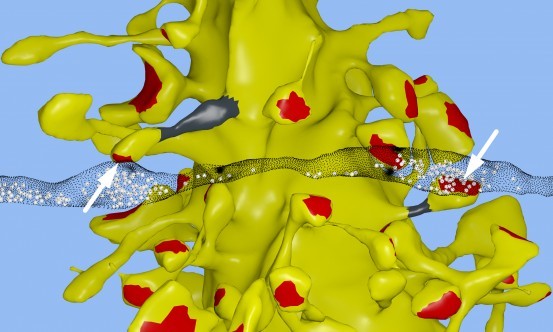By Ana Verayo, | January 22, 2016

Synapses in the brain possess different sizes, the bigger they are, the more memory they can store.
Scientists say that the memory capacity of the human brain is 10 time greater than first thought, where new research reveals the size and capacity of the brain's neural connections are highly underestimated.
Researchers from the Salk Institute in California now provide key insights about how the human brain can manage to become very energy efficient, that can only need low energy but still execute great computational prowess.
Like Us on Facebook
According to Terry Sejnowski from the Salk Institute for Biological Studies, this is a real "bombshell" news in the field of neuroscience, where this new study's measurements of the brain's memory capacity is now increased by a factor of 10, computing at least one petabyte which is comparable to the world wide web.
Also known as synapses, these patterns derived from chemical and electrical activity inside the brain are utilized as patterns for thought storage and memories, when branches of neurons connect and interact with each other.
With the help of chemicals known as neurotransmitters, these trigger signals across other synapses inside the brain with other neurons. Researchers say that each neuron can contain thousands of synapses that are linked with thousands of other neurons. Apart from this, the size of each synapse is also crucial, where researchers say that the larger the synapse, the most likely it will send a signal successfully to another nearby neuron.
In this new study, scientists discovered that synapses can possess different sizes, from smaller than eight percent, suggesting that sizes can vary with as many as 26 types of synapse sizes, as opposed to just a few sizes, based on prior studies.
This complex variation in synapse sizes reveal that the human brain have a higher potential in memory capacity than first thought, according to researchers. Sejnowski says that these implications show that apart from the chaotic qualities of the human brain, this precision in size and shapes of synapses are hidden from us.
During an analysis of neurons in the hippocampus, which is the memory center of the brain, researchers found this remarkable discovery in rat brains, that led to estimating the storage capacity of brain synapses.
Apparently, one average synapse has the ability to store 4.7 bits of information. Researchers now suggest that the human brain storage capacity is estimated up to a petabyte or 1,000,000,000,000,000 bytes, which is 10 times greater than what was previously believed.
This new finding can lead to better and more efficient computer system designs, to create more energy efficient machines based on the powerful neural network capacities of the brain.
This new study is published in the journal, eLife.
-
Use of Coronavirus Pandemic Drones Raises Privacy Concerns: Drones Spread Fear, Local Officials Say

-
Coronavirus Hampers The Delivery Of Lockheed Martin F-35 Stealth Fighters For 2020

-
Instagram Speeds Up Plans to Add Account Memorialization Feature Due to COVID-19 Deaths

-
NASA: Perseverance Plans to Bring 'Mars Rock' to Earth in 2031

-
600 Dead And 3,000 In The Hospital as Iranians Believed Drinking High-Concentrations of Alcohol Can Cure The Coronavirus

-
600 Dead And 3,000 In The Hospital as Iranians Believed Drinking High-Concentrations of Alcohol Can Cure The Coronavirus

-
COVID-19: Doctors, Nurses Use Virtual Reality to Learn New Skills in Treating Coronavirus Patients







